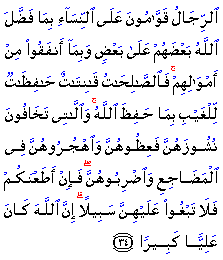Living The Quran
From Issue: 666 [Read full issue]
Matrimonial Relations
Al Nisa (The Women) - Chapter 4: Verse 34
 "Men are supporters of wives because God has given some of them an advantage over others and because they spend of their wealth. So the ones who are in accord with morality are the ones who are morally obligated, the ones who guard the unseen of what God has kept safe. But those whose resistance you fear, then admonish them and abandon them in their sleeping place, then go away from them; and if they obey you, surely look not for any way against them; truly God is Lofty, Great."
"Men are supporters of wives because God has given some of them an advantage over others and because they spend of their wealth. So the ones who are in accord with morality are the ones who are morally obligated, the ones who guard the unseen of what God has kept safe. But those whose resistance you fear, then admonish them and abandon them in their sleeping place, then go away from them; and if they obey you, surely look not for any way against them; truly God is Lofty, Great."
In the light of other verses of the Quran, the collective injunctions of Shariah and the overall Prophetic ideals and traditions, Sunnah, we find that the real spirit of the matrimonial relations is shaped by the sentiments of “affection” and “compassion” and the obligations of “patronage”, so that the governing factors in such relations are “affection, compassion and benevolence.”
Care
The Arabic word "qawwamun", with its preposition "'ala" which describes the relation of men to women in the above verse, does not imply any superiority, but simply means "taking full care of". The distinctiveness between men and women is related to the woman's pregnancy, delivery, and nursing, which make it necessary that the man should have the responsibility to provide for her needs and the needs of the children, at least when she is hindered with such a distinctive natural function of reproduction. This hindrance is not permanent, and it cannot be a reason to keep the women at home all her life, and neither does it hinder her intellectual and psychological merits. She is not supposed to bear children or raise them all her life, and at a certain age children have to go to school.
Reconciliation
The issue of “chastisement” strongly arises a problem to the structures of the family and human relations and receives exceptional interests because it is referred to in this Quranic text (by almost all translators) and because its historical and traditional interpretations were purported by most people to denote slap, flap, flog, beat, strike, punch, etc.
This would definitely involve a strong sense of pain and humiliation regardless of the extent of the physical suffering itself which may vary, according to some fatawa, around few strokes with a siwak (tooth cleansing) stick or the like, as rendered by Abdullah b. Abbas in responding to an inquiry regarding the construal of the “mild chastisement.” On the other hand, we find some fatawa regulate “chastisement” so that it must not exceed forty strokes, and “no retribution between man and his wife (in regard to chastisement) except for wounds and murder.”
Considering the context and situation, the purpose of reconciliation, the Islamic doctrine of human sanctity and dignity, the right of self-determination in Islam, the consensual nature of the nuptial association, and the ability of nuptial partners to gracefully dissolve such association without coercion or intimidation, the denotation of daraba in this citation cannot imply the infliction of injury, pain or disgrace. The most candid construal is to imply separation, departure, partition or seclusion.
This type of arrangement, where the spouses leave each other for some time, would help to streamline the bitter relationship because it is a step that goes farther than admonishing and refusing to share bed. Now, the spouses will have ample opportunity to rethink the whole situation, to ponder the eventual consequences, and to realize the inevitable conclusion of rejection, namely, divorce. At this point, they will have a full chance to re-examine their intent and conduct and to decide whether they want this threshold of separation to be a lasting state!
Compiled From:
"Chastising Women: A Means to Resolve Marital Problems?" - AbdulHamid A. Abu Sulayman
"The Subime Quran" - Laleh Bakhtiar
"Are women created only for family life?" - Fathi Osman